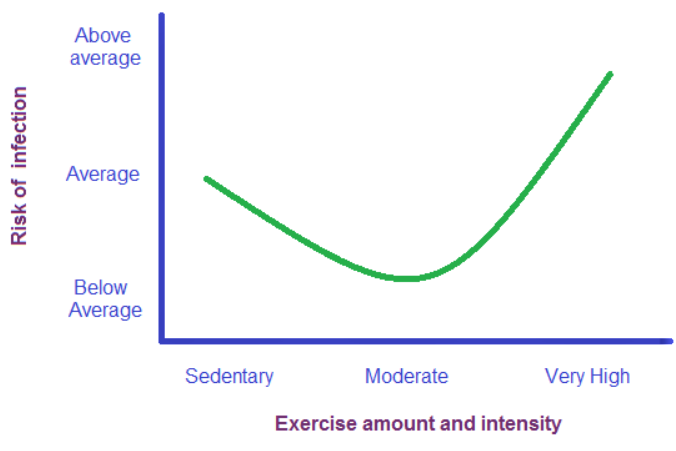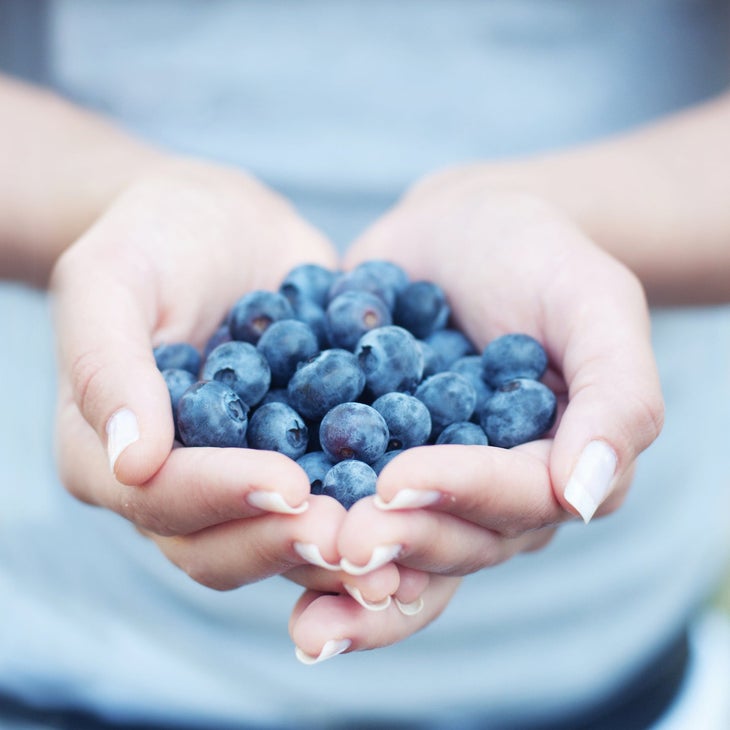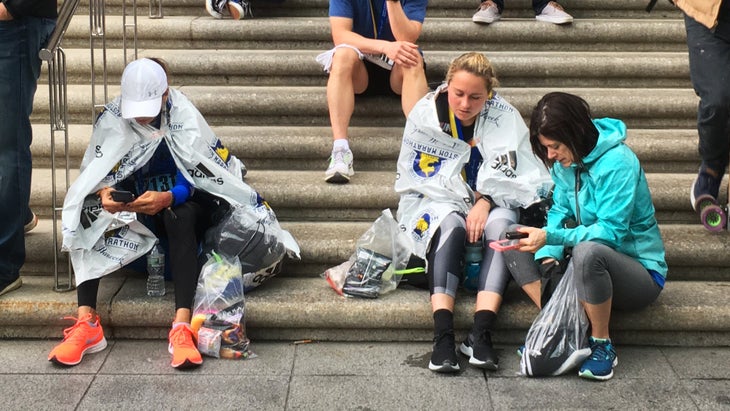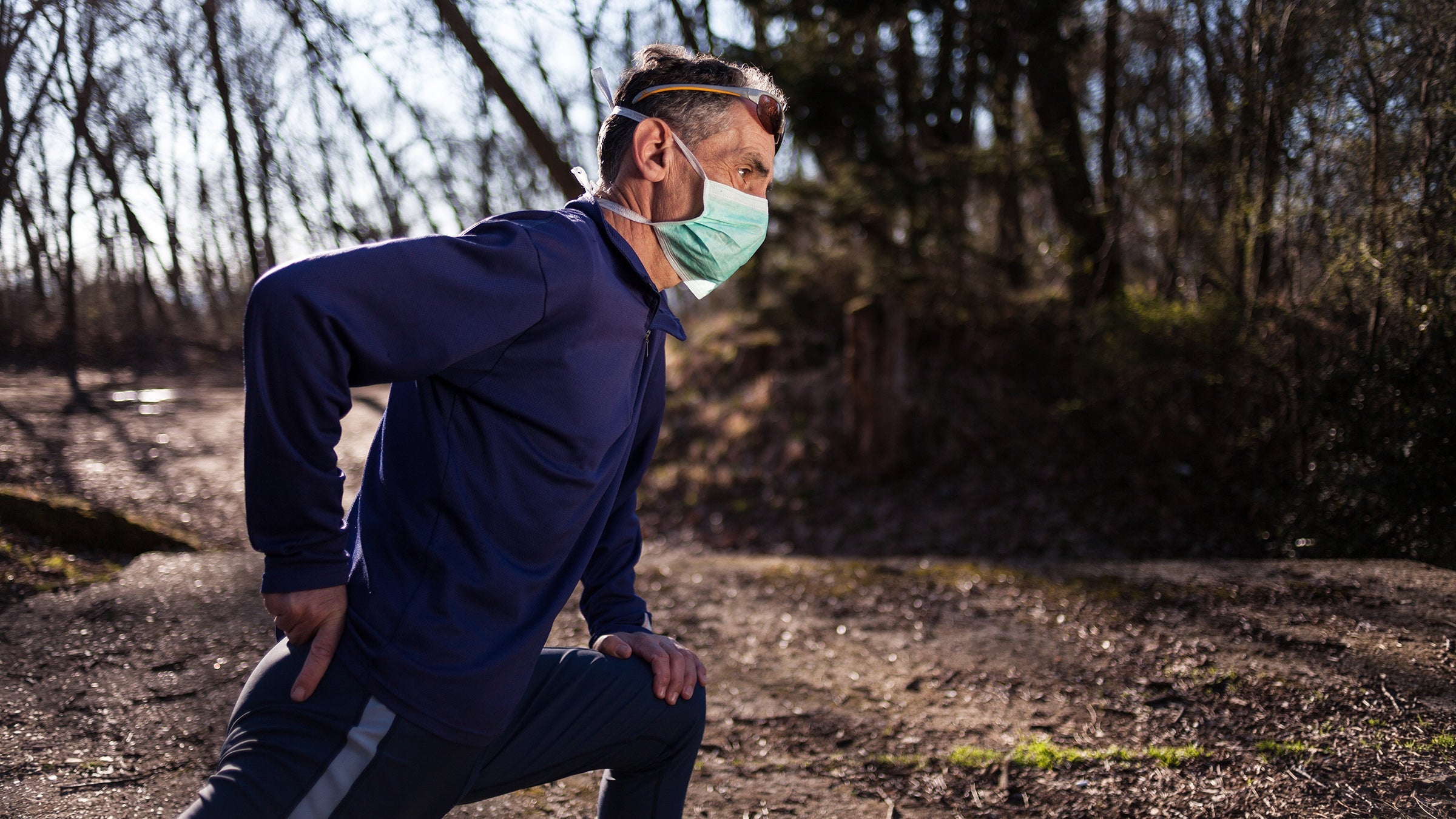Early in his career as an exercise physiologist, David Nieman taught a “marathon” course at Pacific Union College. He was a marathoner himself, eventually accumulating 58 marathon finishes, and his students entered a marathon at the end of the semester. Like others at the time, Nieman thought marathon running was just about the best thing anyone could do for their health.
So he was confused and concerned when a number of his students came down with colds after their marathon. He says he “felt sorry for them,” because it was also time for their final-exams. Who wants to be sick when they’re cramming for finals?
Nieman has spent the last 40 years studying links between exercise and immunity. It’s not a new field. The first published report of unexpected white blood cell counts in Boston Marathon runners appeared in 1902.
Immunity, however, is something many runners are thinking about this year. How should you adjust your training and diet to maximize your immunity, and minimize your chances of catching the virus? Below is a list of Nieman’s recommendations on the subject, condensed from a long conversation with him. Nieman is currently a biology professor at Appalachian State University, and director of the human performance laboratory at North Carolina Research Campus.
Understand How the J-curve Works

Exercise studies, including Nieman’s and many others, show that regular, modest exercise boosts immunity, and lowers your risk of infection. That’s the good news—and the reason so many scientists believe that running and other regular exercise is a healthy, body-strengthening activity.
On the other hand, hard, continuous, long-effort exercise like marathons and ultra marathons can lower your resistance for 24 to 72 hours, and lead to increased colds and respiratory illnesses for a week or two. Too much exercise volume and intensity turns the corner on the J—and your risk of infection goes up.
Nieman and colleagues recently measured the immune response of Antarctic trekker Colin O’Brady, who in late 2018 became the first person to cross the continent unassisted, covering 930 miles in 54 days. The research team found that O’Brady entered a state of “dysfunctional immune response” that was most severe during the last month when his “energy expenditure was highest, body mass was reduced, and training distress was most severe.” These produced a “decrease in performance measures.”
In a 2003 report on runners in the Western States 100, Nieman showed that finishers “experienced large perturbations in blood immune cell counts, inflammatory cytokines, salivary IgA secretion rate, and indicators of oxidative stress.” When optimal immunity is your goal, it appears that more is not better.
Stick to 60/60/60
In his famous exploration of immunity at the Los Angeles Marathon, Nieman found that runners who had been training 60 miles a week or more had double the post-marathon infections of those training under 20 miles a week. Overall, marathon finishers had six times more infections and respiratory illnesses post marathon than a control group of non runners. This lowered immunity was transitory, meaning it didn’t last long, but it was significant enough to produce more post-marathon illness.
Nieman now suggests that running at greater than 60 percent of max for more than 60 minutes also lowers immunity. There’s your handy, easy to remember 60/60/60. Run less than 60 miles a week, mostly at a low intensity (60% of max VO2 corresponds to 75% of max heart rate), mostly in workouts that are less than 60 minutes at a time.
Try Intermittent Running
Nieman and colleagues have been surprised by one of their consistent findings. While long, hard runs seem to lower immunity, the same is not true of long, intermittent runs. In other words, a long marathon-pace run is a stressor, but if you follow a run/walk approach or even 10 minutes hard/10 minutes easy, you reduce the lower-immunity threat. “When you do a back-and-forth kind of running, your body seems to react in a favorable way, like you’ve just been out for a walk,” Nieman observes.
Carbs, Carbs, Carbs
Yes, we live in a world where many are intrigued by ketogenic diets. Nieman isn’t among them. He believes the key nutrient bonding exercise and good health is carbohydrates: before, during and after running. Indeed, he notes a whole new science of immuno-metabolism that puts glucose and glycogen in the center of healthy immunity just as they are key to strong endurance running.
He can now measure glycogen in immune cells, and has discovered that a three-hour run (with no carb intake) depletes those cells just as it depletes your leg muscles. The immune cells become noticeably dysfunctional. You could say they bonk. When runners consume carbs during the three-hour run, on the other hand, their immune cells “look and perform much better,” says Nieman.

Blueberries!
Nieman has long been interested in polyphenols, flavonoids and other food substances that support immunity. These are mostly found in blue, purple, red and orange fruit, and to a lesser extent in colorful vegetables. In a soon-to-be-published paper, he explored the effects of blueberries on immunity and inflammation after a three-hour laboratory run. One group of runners ate a daily cup of blueberries for two weeks before the lab run. Another group didn’t. “The blueberries knocked down the pro-inflammatory response by a lot,” he says, noting that this group of runners also had less muscle soreness.
According to Nieman, Americans on average eat only one serving of vegetables and one of fruit per day—much less than the recommended amounts. This pattern has changed little in recent decades. While he’d prefer that everyone eat whole fruit and veggies, he’s also somewhat tired of beating the drum without much success. So he suggests “fruit extracts and supplements” for those who just aren’t going to change their dietary patterns.
He has investigated other frequently-mentioned approaches like vitamin C and probiotics, and finds little evidence that they make a significant contribution to immunity. In Nieman’s world, if you’re consuming healthy carbs and blueberry-like, flavonoid-rich foods, you’re about 90% down the road to an immunity-boosting diet. He’s also a modest fan of the flavonoid, quercetin, and green-tea extract.
The Marathon and Coronavirus: A Special Case
Nieman is not trying to talk anyone out of running a marathon (with one exception: See the next point). He understands that the challenge of special, infrequent events — even virtual ones — does much to increase motivation and … well, just add more spice to our lives. And that’s important.But he does want you to realize that your chances of contracting a virus, including coronavirus, are substantially increased after a marathon.
So, take some carbs before, during and especially after your marathon. And keep any post-race celebration to the minimum amount of people. “Social isolation for about 24 hours after a marathon can definitely lower your chances of getting sick,” Nieman notes.

The Marathon and Coronavirus: A Very Special Case
If you’re training for a marathon or getting ready to run a marathon and you learn that you’ve been in contact with a known coronavirus carrier, back off. If you’re close to your marathon date, consider not running. “After a marathon, your immune state is close to that of an older, not particularly healthy individual,” notes Nieman. “And those are the ones getting really sick and sometimes even dying. It’s just not worth the risk. Remember, your health is the most important thing, not your marathon.”
Do the Right Things
Everyone has been hearing plenty about washing their hands for 20 to 30 seconds several times a day, sneezing and coughing into the elbow, and not touching your face with your hands (use tissues or sanitized wipes). Nieman seconds all this advice and adds, encouragingly, “We’ve known this for a long time, but it’s the first time in my experience that many Americans are actually paying attention.”
As it has become evident that COVID-19 is primarily transmitted through airborne droplets, Nieman affirms the importance of face coverings and social distancing as effective strategies for reducing the risk for infection.
Keep Running for a Lifetime of Good Health
Everyone knows — and the coronavirus has particularly reflected this — that older individuals are more likely to get sick and suffer from virus threats and other immune-system attacks. There’s a name for this: immunosenescence. It means, basically, the older you are, the lower your immunity.
There’s also a simple way to protect yourself from immunosenescence: Keep exercising. “It’s one of the biggest, most important and most amazing effects of exercise,” says Nieman. “Overall, regular exercisers are about 20 to 30 years younger, in terms of their immunity, than those who don’t exercise.”
More Simple Tips
In a 2019 paper published in The Journal of Sport and Health Science, “The compelling link between physical activity and the body’s defense system,” Nieman and Laurel M. Wentz suggest several other simple and effective immunity-enhancing strategies that runners can follow all the time:
- Develop a specific training plan built around ample recovery, sleep and possible mental stressors.
- Don’t do individual workouts or weekly total workouts significantly harder than you’ve been doing.
- Monitor yourself closely for early signs of illness and/or overtraining, and adjust accordingly.
- Avoid excessive alcohol intake.
- Adapt stress management strategies to control for life’s hassles.
Updated from article originally published March 11, 2020

